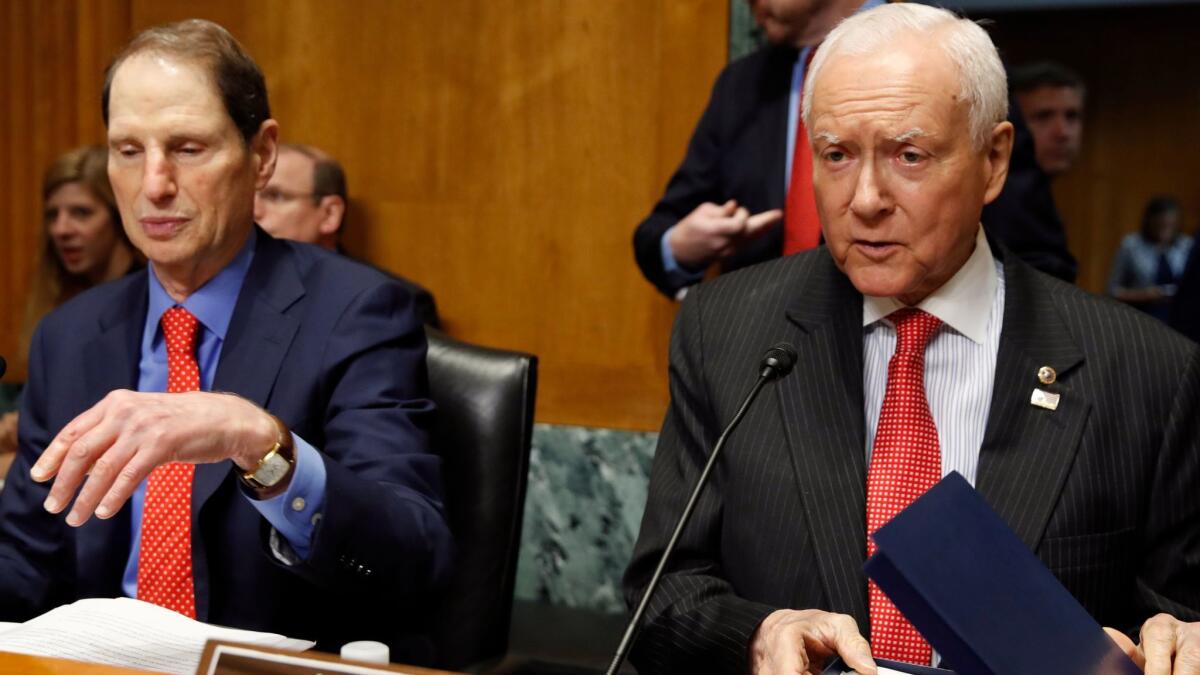Three weeks and counting: As Congress dithers on children’s health program, more states face crisis

- Share via
Congress has hardly slathered itself with glory in its current session, but among its most shameful failures surely is its failure to renew funding for the Children’s Health Insurance Program, which provides coverage for about 9 million low-income children and pregnant women.
As we’ve reported before, Congress failed to renew CHIP before its previous two-year reauthorization expired on Sept. 30. The clock has now ticked off more than three weeks without a vote, with nothing further scheduled for at least another week.
Most states had enough in their program accounts to carry them through to the end of the year or even into the first quarter of next year. But as the delay stretches on, more states are being forced to come to grips with the absence of funding in the near term.
Every day that goes by, the closer Texas gets to cutting off healthcare for kids.
— Adriana Koehler, Texans Care for Children
Last week, Virginia officials announced that they would have to start issuing notices by the beginning of December to the households of 65,000 children and 1,100 pregnant women that they faced disenrollment from CHIP. That’s to give the families 60 days’ notice that they’ll lose coverage when funding runs out at the end of January.
“Congress is acting as if it’s just a matter of when the money runs out, and they’re not acknowledging the work and the investment that states have to make in trying to do this in the least chaotic way possible,” Linda Nablo of the state’s Medicaid office told the Richmond Times-Dispatch.
In Texas, where the program covers more than 1 million children, officials initially estimated that they would have enough CHIP funding to last well into 2018. Then came Hurricane Harvey — demand shot up, and after the federal government waived co-pays and enrollment fees for families, funding came down. Now the state says it may run out of funds in January. “Every day that goes by, the closer Texas gets to cutting off healthcare for kids,” says Adriana Koehler of the advocacy group Texans Care for Children.
Five states already have received emergency funding from Medicaid. That includes California, where 2 million children were enrolled in CHIP in fiscal 2016. The state expected its funding to run out by the end of this year, but has received a $177-million federal infusion; it’s unclear how long that will last. Oregon, Washington and Minnesota received enough spare cash to extend their programs through November, and Arizona got enough to keep operating through December.
All told, 11 states face an end to their funding by the end of this year and another 21, including the District of Columbia, have enough in their coffers to last through next March.
Children’s advocates are unnerved by the constant delays in reauthorizing the funding. At first, it appeared the delay would be only a week or so, since agreement on a bill had been reached in mid-September by Sens. Orrin Hatch (R-Utah) and Ron Wyden (D-Ore.), key legislators on the matter. But a timely vote on their deal was delayed by the congressional frenzy over the Cassidy-Graham bill, a final misbegotten Republican effort to repeal the Affordable Care Act.
Since then, Congress has been preoccupied by one craze after another. “CHIP keeps being put on the back burner,” says Bruce Lesley, president of the children’s advocacy group First Focus. “Now the conversation is about taxes. The kids’ piece keeps being bumped.” As recently as Monday, Sen. Orrin Hatch, R-Utah, and Rep. Kevin Brady, R-Tex., devised yet another obstruction in the form of an Affordable Care Act repeal proposal that would waive the ACA’s individual mandate and add more abortion restrictions to the law, rendering it a nonstarter for Democrats and therefore dead on arrival. But it will suck up mindshare on Capitol Hill that should be spent on CHIP—an especially cynical act for Hatch, who was one of the original sponsors of CHIP in 1997 and supposedly considers the program a personal pet.
Republicans and Democrats also are squabbling over the “offsets” demanded by the GOP in order to continue the $15 billion in funding for CHIP. The GOP has demanded cuts or premium increases for Medicare. Although these would be aimed chiefly at higher-income enrollees, Democrats object to the principle of taking the offsets out on beneficiaries, according to Lesley.
Already bound for the chopping block by bipartisan agreement is an increase of 23 percentage points in CHIP funding that was enacted as part of the Affordable Care Act. Conservatives have wanted to roll that back immediately; the Republican and Democratic negotiators worked out a deal to phase it out over four years instead.
Children’s advocates generally have accepted that giveback in return for assurances that the program would be extended. But with the delay stretching on, some are beginning to lose faith. And without assured funding, states increasingly will have no choice but to plan for disenrolling families or cutting benefits. One would have thought that renewing a program that benefits children above all — and one that has enjoyed bipartisan support since its creation 20 years ago — would be the easiest bite to swallow on the congressional menu. Apparently, one would be wrong.
Keep up to date with Michael Hiltzik. Follow @hiltzikm on Twitter, see his Facebook page, or email michael.hiltzik@latimes.com.
Return to Michael Hiltzik’s blog.
MORE FROM MICHAEL HILTZIK
Republicans want to slash tax deductions for your 401(k). That’s actually a good idea!
By attacking Obamacare, Trump has driven up the number of uninsured Americans by 3.5 million
More to Read
Inside the business of entertainment
The Wide Shot brings you news, analysis and insights on everything from streaming wars to production — and what it all means for the future.
You may occasionally receive promotional content from the Los Angeles Times.











